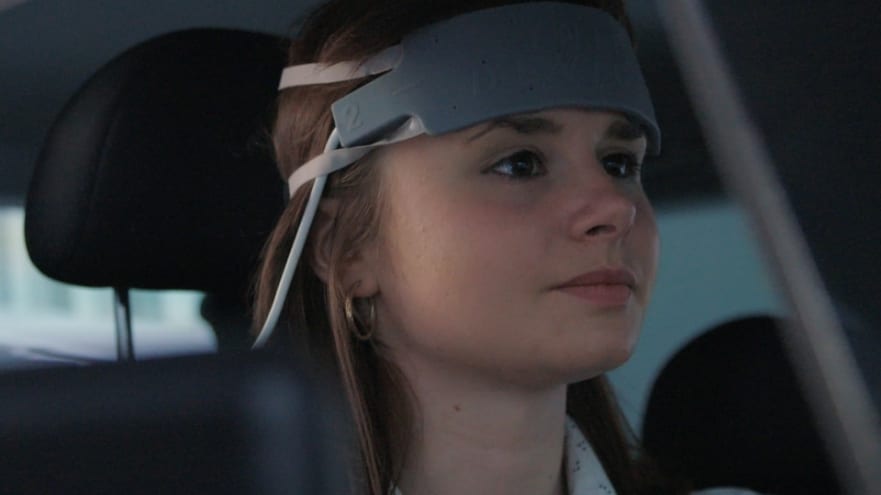- New Ford Smart Mobility experiment calculates a personal driver score based on driver’s behaviour on the road, such as steady acceleration and steering smoothly
- Empowering customers with their own data to develop a personal driver score could help them with reduced rates for services such as car‑hire, car-sharing and ride-sharing
- Prototype driving app helps drivers to achieve goals in a similar way that they might use an exercise or weight-loss app
- Driver Behaviour Project also researches responses of volunteers in stressful driving situations, on the road and using a driving simulator, with eye-tracking and heart monitors
- As headline sponsor of London Technology Week, Ford demonstrates research during networking session and panel discussion “Changing the way the world moves”
LONDON, June 21, 2016 – Rewarding good drivers with reduced travel costs is the idea behind a new Ford Smart Mobility experiment that takes a similar approach to achieving goals as that employed by fitness and exercise apps.
The Ford-led Driver Behaviour Project explores providing drivers with a personal score, based on various driver inputs, and accessed via a prototype smartphone app. This type of research could lead to cheaper car-hire and car‑sharing, and provide insurers with information required to support discounts.
“Like an activity-tracking app that shows the distance we cover and calories we burn, a personal driver score encourages people to drive smarter,” said Jonathan Scott, project lead, Ford Smart Mobility. “We wanted to better understand how people use our products so we could help them to improve that behaviour – and a score, combined with guidance, makes it easier to improve.”
Over a four-month period, plug-in devices gathered data from more than 40 Ford Fiestas, driven by volunteers in London, to record actions that each driver took over 160,000 kilometres and more than 4,000 hours. This included detailing the slightest turn of the steering wheel and harsh braking, as well as time of day, weather, and road history.
Ford’s perspective is that customers own their data and the company is exploring ways that customers can use this data to their advantage. For this project, the vehicle data empowers drivers with their personal driving score, based on activities such as steady acceleration and steering smoothly.
The app enables drivers to see how different driving behaviours affected that score, and offers insights to help improve – such as driving in the correct gear. It also calculates a score for each journey based on the driver’s interaction with the vehicle, as judged via the data received on accelerating, braking, and steering. The score changes according to the results of each journey, with a graph showing the trend over time, enabling drivers to see on which days their scores were higher or lower.
Both Ford’s data scientists and transport data experts, Transport API, will now analyse the data to gain further insights. In addition to the vehicle-specific data, global design company IDEO was engaged to research what people say, think, feel and do when behind the wheel. This showed a significant difference between how people think they drive, and how they actually do drive.
“From the vehicle data and research gathered, we were able to test an internally developed, highly advanced driving score algorithm. The score could be used to develop a mobility profile, enabling drivers to save money on services tailored to their needs,” Scott added.
Ford is currently expanding into both an auto and a mobility company; as such the company is aggressively pursuing emerging opportunities through Ford Smart Mobility – its plan to be a leader in connectivity, mobility, autonomous vehicles, the customer experience, and data and analytics. The Driver Behaviour Project could help to enhance current mobility solutions, including the on-demand GoDrive car sharing service and the on demand ride sharing service GoRide.
Identifying driver stress
The project team also is studying how driving affects the physical and emotional states of another group of volunteers in the U.K., at the University of Nottingham. This research is exploring ways to help people become better drivers.
Volunteers are subjected to a series of driving situations, both using a driving simulator and real world driving, during which their heart rates, eye movements, and brain patterns are monitored. The research highlights when drivers are nervous or stressed, such as in heavy traffic, or when larger vehicles reduce visibility.
Changing the way the world moves
Ford is demonstrating the Driver Behaviour Project, along with Ford Smart Mobility services and the company’s new mobility experience platform FordPass at London Technology Week, with events taking place across the city from June 20-26.
Also on show is smart parking system GoPark, soon to be available with a new space‑finding function. Portable hardware devices plugged into participating vehicles will help to identify vehicle locations and enable a powerful, probability-based algorithm to let members know the likelihood there will be a space free at their chosen destination.
As headline sponsor of London Technology Week, the company is hosting the panel discussion and networking session “Changing the way the world moves” at 16:30 CET, on June 21, at the Vinyl Factory, in Soho. Mobility and technology experts from Transport for London, the geocoding system What3Words, technology focused merchant bank Lepe Partners and IDEO will be among the panellists. The session will be moderated by startup expert, connector and advisor Bindi Karia. Guests also will be able to talk to Mike Nakrani, head of Ford Smart Mobility Europe, and other Ford Smart Mobility project leads.

